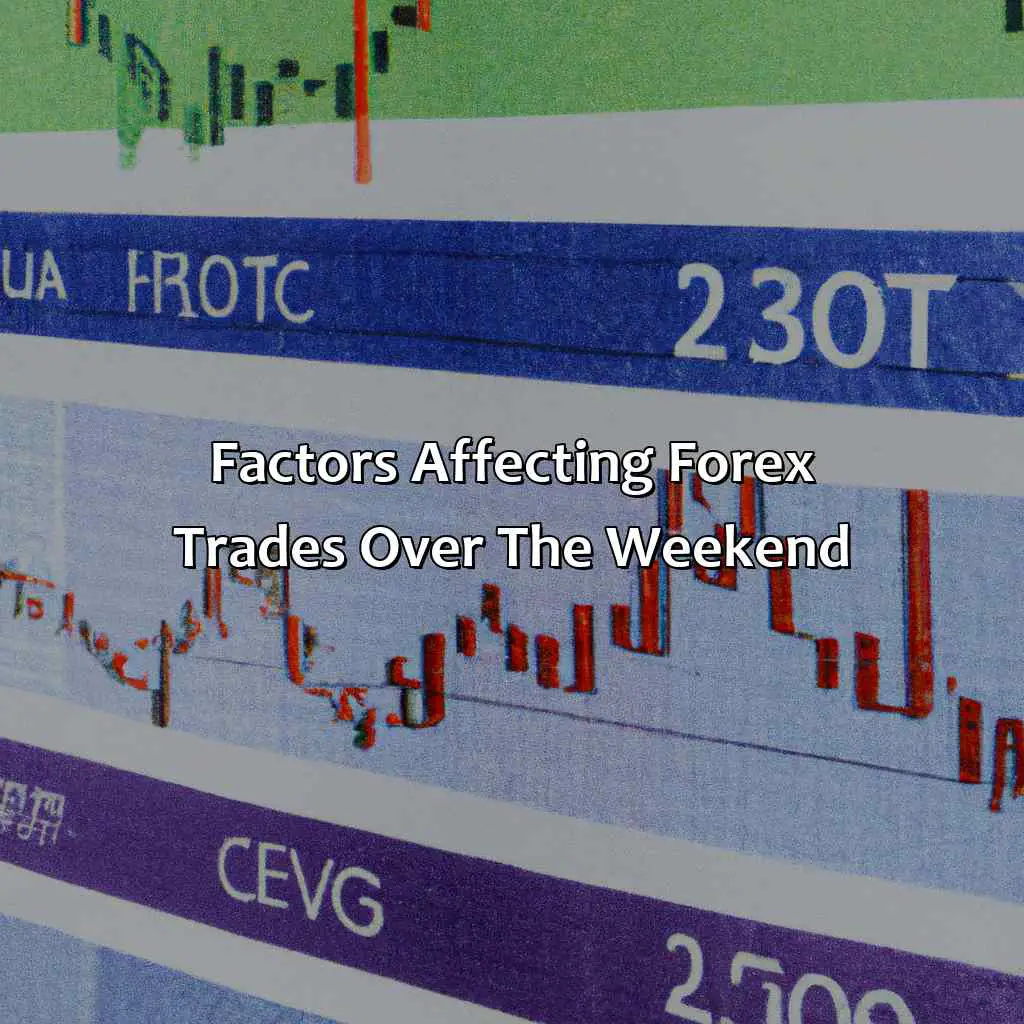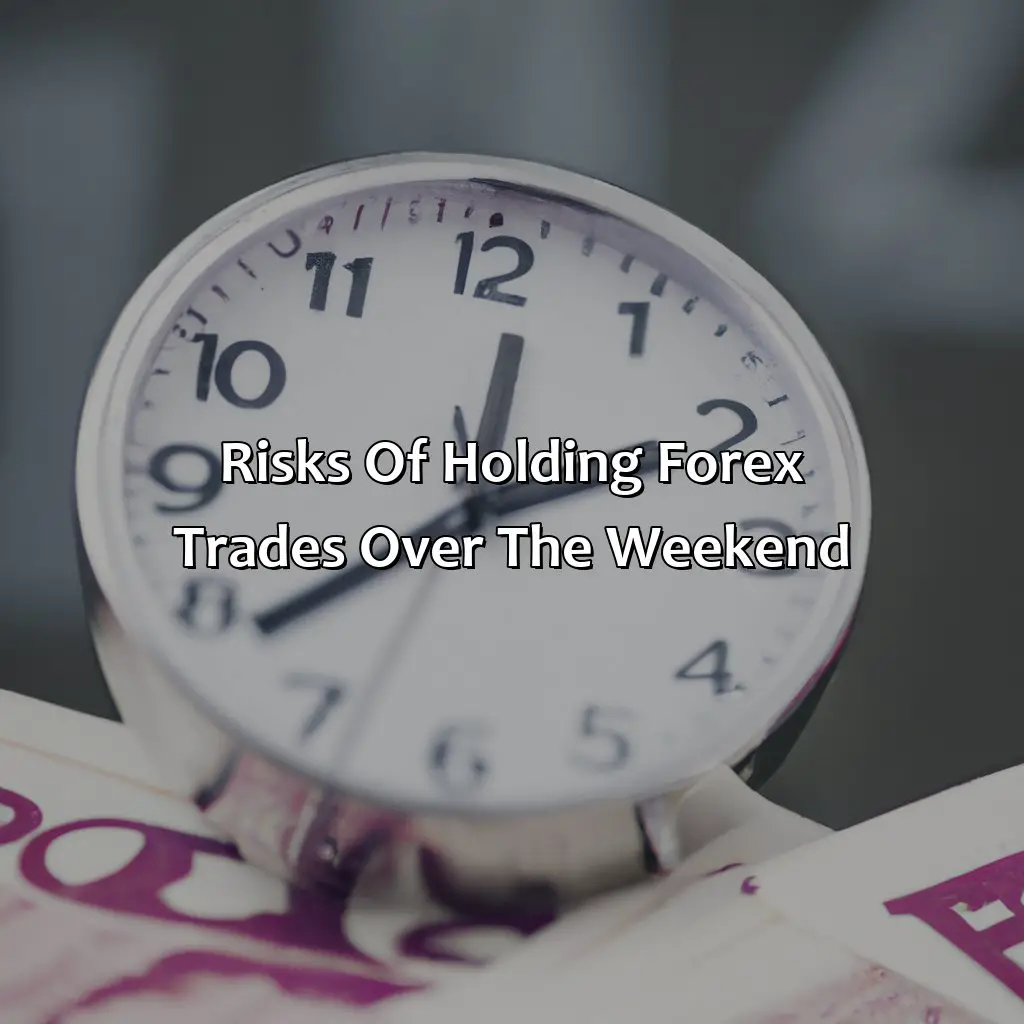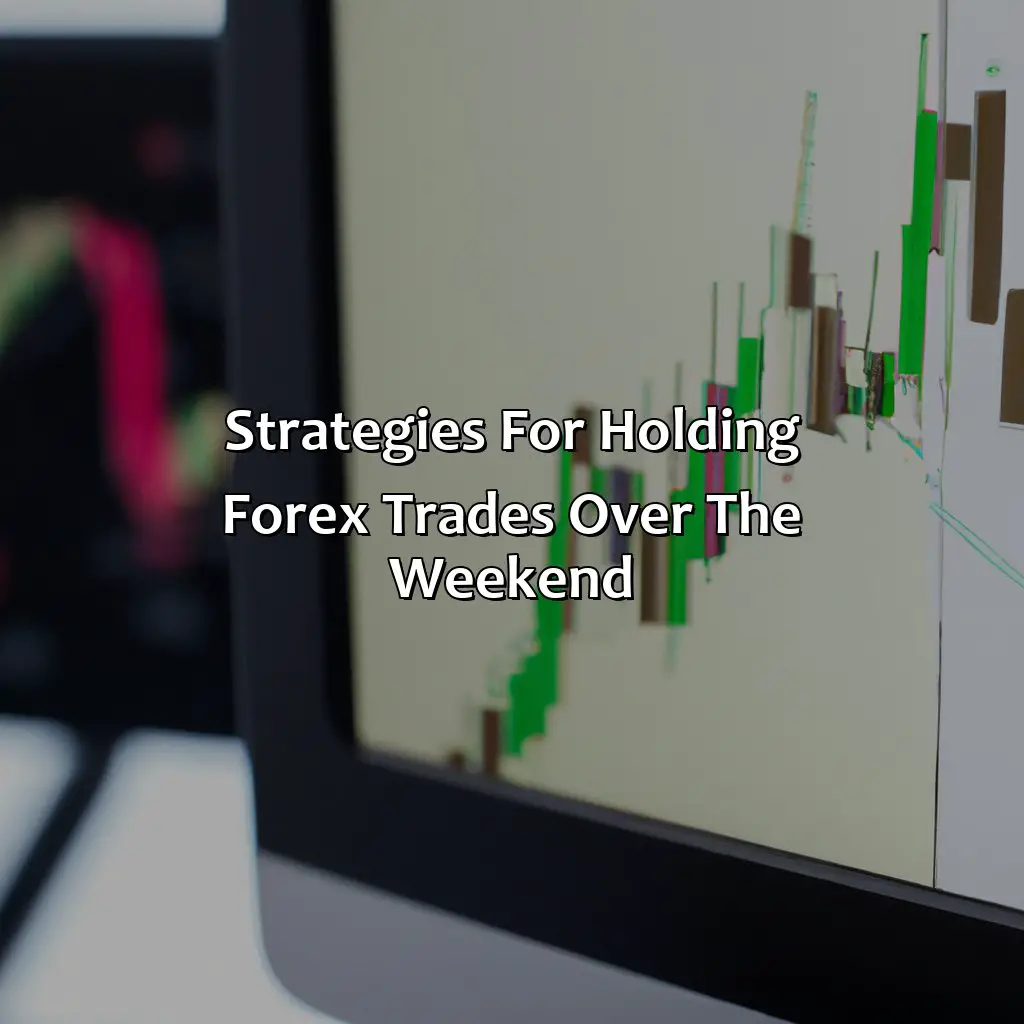
Key Takeaway:
- Factors affecting forex trades over the weekend include economic indicators, geopolitical events, news events, trading psychology, market sentiment, technical analysis, and fundamental analysis. These factors can impact exchange rates and create market volatility, which can present both risks and opportunities for forex traders.
- Benefits of holding forex trades over the weekend include avoiding weekend gaps and taking advantage of rollover interest. However, traders should consider the risks associated with holding trades over the weekend, including unforeseen news and events, weekend trading conditions, and weekend trading fees.
- To mitigate risks, traders can use strategies such as hedging, setting stop-loss orders, and monitoring trades closely. It is also important to have a trading plan and risk management strategy in place, and to stay informed about market conditions and news events that may impact forex trades over the weekend.
Factors Affecting Forex Trades Over the Weekend

Photo Credits: forexbrokerreport.com by Jerry Miller
Forex trades over the weekend are influenced by various factors. Economic indicators, geopolitical events, and news events have a significant impact on the forex market. Traders need to pay attention to these events and their potential impact on forex rates. Additionally, trading psychology and market sentiment are also important considerations to keep in mind when deciding whether to hold forex trades over the weekend. Technical and fundamental analysis can also offer insights into the market and help traders make informed decisions. Understanding and keeping track of these factors can help traders mitigate risks and maximize profits.
Moreover, the forex market is highly volatile, and weekend trading can be particularly risky. Market disruptions can occur when trading volumes are low, leading to unpredictable price movements. As a result, traders need to exercise caution and review their risk management strategies before making any decisions.
One true story highlights the risk of holding forex trades over the weekend. In 2015, the Swiss National Bank stunned the market by scrapping the currency peg that had limited the Swiss franc’s value against the euro. This decision led to massive losses for many traders who were holding Swiss franc positions over the weekend. The incident serves as a reminder that traders should always be prepared for unexpected events and have appropriate risk management measures in place.
Benefits of Holding Forex Trades Over the Weekend

Photo Credits: forexbrokerreport.com by Jonathan Thompson
To keep forex trades over the weekend, you need to know the advantages it offers. In this article, we discuss the positive aspects of holding trades on the weekend. We focus on avoiding weekend gaps and capitalizing on rollover interest.
Avoiding weekend gaps involves strategies to avoid market gaps during the weekend. Plus, take advantage of trading opportunities.
Taking advantage of rollover interest means managing risks and boosting profits. To do this, analyze market trends, news, and liquidity.
Avoiding Weekend Gaps
Avoiding the Negative Impact of Weekend Price Action
While trading opportunities may arise over the weekend, weekend trading carries higher risks. Weekend gaps are a common phenomenon in foreign exchange markets, presenting significant challenges to traders. These gaps occur due to market conditions beyond one’s control, such as unexpected news releases or geopolitical events.
The gap between Friday’s closing price and Monday’s opening price typically widens during periods of market volatility. This is attributed to a lack of liquidity and reduced global trading activity that creates an imbalance between buyers and sellers. The absence of large players like institutional investors exacerbates this condition.
To avoid potential losses when holding forex trades over the weekend, traders must use effective risk management strategies. Technical analysis tools can be applied to chart patterns, trend lines, Fibonacci retracements, support and resistance levels, candlestick patterns, price action and breakout/inverse strategies before initiating trades.
Pro Tip: Traders should consider hedging their positions and closely monitoring their trades using stop-loss orders. This ensures they exit profitable trades while mitigating any potential losses arising from unforeseen events during the weekend.
Make your forex profits work for you even when you’re not trading with rollover interest.
Taking Advantage of Rollover Interest
Rollover interest refers to the interest paid or earned when a forex trade is held overnight. By holding onto a trade over the weekend, traders can take advantage of rollover interest, which can add to their profits. This is especially true for carry trading, where traders borrow funds in currencies with low-interest rates and invest in those with high-interest rates.
The amount of rollover interest depends on the difference in interest rates between the two currencies being traded. Traders need to factor in this cost when calculating their potential profits or losses. It is also important to note that rollover interest can be negative, resulting in additional costs for holding trades over the weekend.
In addition to considering potential profits from rollover interest, forex traders must also assess risks related to holding trades over the weekend. Unexpected news events or market developments can occur at any time and lead to gaps in prices when markets reopen on Monday morning. Proper risk mitigation strategies such as stop loss and take profit orders should be set and monitored closely.
Traders with a long-term trading style may benefit from holding trades over the weekend by avoiding weekend gaps and taking advantage of rollover interest, but it is crucial to have a trading plan and goals set beforehand. Additionally, traders need to factor in trading costs associated with holding trades over weekends.
Overall, while taking advantage of rollover interest has its benefits for forex traders, it is important to assess all potential risks and incorporate proper risk management strategies into their overall trading plan. Taking your forex trades to the weekend is like playing Russian roulette with economic indicators, geopolitical events, and news events as your bullets.
Risks of Holding Forex Trades Over the Weekend

Photo Credits: forexbrokerreport.com by Donald Davis
Grasp the perils of keeping forex trades through the weekend. Consider unseen news, events and the conditions of weekend trading. Comprehend the intricacies of the forex market. Numerous economic and political elements have an impact on forex trading. Analyze the market trends and movements via technical or fundamental analysis. Get insights into trading psychology and market sentiment which are critical parts of the decision-making process. Learn about unexpected news and events, weekend trading conditions, and fees for weekend trading. Each has an exclusive angle on the dangers.
Unforeseen News and Events
In the unpredictable world of forex trading, unforeseen market disruptions can wreak havoc on trades left open over the weekend. Geopolitical and news events pose significant risks during this time, and traders need to be vigilant in assessing these risks through technical and fundamental analysis. The resulting market sentiment can have a considerable impact on profits or losses.
The impact of unexpected occurrences, such as presidential executive orders or natural disasters, cannot be predicted accurately by fundamental analysis alone. Trading psychology plays an important role in managing the associated risks of holding onto a trade over the weekend. Hence, traders need to adopt strategies such as setting stop-loss orders or closely monitoring trades to avoid losses.
To prevent missing out on potential profits from positive news events that may occur during the weekend, some traders may opt to hold their positions over the weekend. However, it is essential to consider the likelihood of a ‘gap’ that could happen once markets open again. By implementing proper risk management practices, including using solid stop-losses and hedging your position if necessary, you can reduce the impact of unknown news events.
When trading forex over the weekend, it is crucial to keep an eye on all factors that may affect your positions at all times critically. Proper vigilance will help you understand how current geopolitical and news events shape market sentiment and inform your future trading strategies accordingly. Failure to do so carries a high risk for those who take an impulsive approach towards trading forex over weekends without considering managing its risks properly via prudent decision-making and technical expertise.
With weekend trading, the forex market never sleeps, but do your analysis and chart patterns before taking advantage of market opportunities.
Weekend Trading Conditions
Weekend trading can have unique market conditions that may impact forex trades. Traders must consider weekend liquidity, global events and political news that can influence the forex market. Understanding market trends, movements and analysis of chart patterns like trend lines, Fibonacci retracements, support and resistance levels, candlestick patterns, price action with breakout strategies as well as reversal strategies are good to consider for taking advantage of potential trading opportunities.
Weekend trading is often characterized by low liquidity, which can lead to increased volatility and unpredictable price changes. High leverage is also prevalent. Traders should closely monitor their positions using stop-loss orders or hedging to mitigate the risk of unfavorable movements. Weekend trading fees may be higher too.
However, traders should not fear weekend trading; sometimes these conditions present unique opportunities to position trade or swing trade with a low leverage strategy based on fundamental analysis about global economic trends and political developments. FOMO (Fear Of Missing Out) on weekend forex movements is quite natural among traders from time to time. Therefore, some traders take calculated risks by holding forex trades over the weekend cautiously.
Why pay extra for weekend trades when the forex market is already costing you enough?
Weekend Trading Fees
Weekend Trading Costs can significantly impact forex traders. Below is a breakdown of these fees that traders face when holding trades over the weekend.
| Fee Type | Details |
|---|---|
| Spread | The spread for forex trading over the weekend may be wider than during regular trading times. |
| Swap Rates | Traders may receive or pay swap rates for positions held beyond Friday’s market close due to rollover interest. |
| Funding Charges | Some brokers charge funding charges for positions that are held over the weekend. |
It is essential to note that in addition to fees, weekend trading conditions and liquidity may not be optimal, leaving traders exposed to unusual moves. Moreover, specific economic news or political events announced over the weekend could affect the price of currencies at the open on Monday.
Fear of missing out can prompt traders to hold their positions over weekends despite its risks. Traders must weigh these factors carefully as they consider whether or not to hold forex trades over the weekend.
Don’t let the weekend ruin your forex strategy – try hedging, setting stop-loss orders, and monitoring trades closely.
Strategies for Holding Forex Trades Over the Weekend

Photo Credits: forexbrokerreport.com by Andrew Hall
To hold forex trades over weekends, you need a strategy. To minimize risk and gain profits, hedging is a great option. Other techniques include setting stop-loss orders and monitoring trades. In the following sub-sections, we’ll explore these strategies. Hedging, Setting Stop-Loss Orders and Monitoring Trades Closely will be discussed.
Hedging
Mitigating forex risks through a protective shield
Experienced forex traders use hedging, an effective strategy to reduce market risks. Hedging involves opening two trades at the same time – one to buy and another to sell. This lowers the trader’s exposure to market volatility and counterbalances any potential losses from one trade with profits from another.
To hedge a long-term forex position on the weekend, traders can use options contracts, which allow them to purchase or sell currencies at pre-determined rates within specific timeframes. Alternatively, traders can open opposite positions in related financial instruments that have a strong correlation with their primary forex pair.
Although hedging can help protect against adverse price movements and safeguard profits, it is not without drawbacks. For instance, some brokers may require additional fees or collateral, while others may impose time limits on hedged positions.
There was a case where a novice trader who held a leveraged position on EUR/USD over the weekend suffered significant losses when political uncertainty led to sudden price spikes in favor of USD. With no safety measures such as hedging in place, they lost most of their investment capital overnight.
Protect your trading goals and mitigate risk by setting stop-loss orders in forex trading, regardless of your trading style or market news.
Setting Stop-Loss Orders
One of the primary concerns for any forex trader is how to minimize risks while maximizing potential profits. One reliable strategy to protect your positions from adverse market movements is by setting stop-loss orders.
Here’s a simple 5-step guide on how you can quickly implement stop-loss orders effectively:
- Determine your trading goals and style, then incorporate specific risk-mitigation measures like setting stop-loss and take profit levels into your trading plan.
- Keep track of relevant market news and updates that could impact market volatility and liquidity during the weekend.
- Decide how much % loss you are willing to accept in exchange for holding an open position over the weekend.
- Set your stop-loss level below the entry price, within a reasonable range based on current support/resistance levels, trend direction, and overall market conditions.
- Monitor your trades closely, especially in fast-moving markets; adjust stop-loss levels or exit positions as necessary depending on new market developments.
It’s important to note that stop-loss orders have limitations, especially during prolonged periods of high market volatility when they may not execute at the intended price level.
Therefore, always ensure to use other risk-management tools like hedging or position sizing alongside stop-loss orders.
As a forex trader, you may miss out on advantageous trading opportunities if you don’t make use of critical strategies like setting stop-loss orders. Protect your margin against unexpected news events and reduce excessive risks in line with your risk management plan today!
Monitoring Trades Closely
To effectively hold forex trades over the weekend, a forex trader must continuously monitor their positions. As such, they should remain up-to-date with market news and events that may significantly affect the currency pairs they have invested in. The trading plan and goals of the forex trader should also guide their actions as they evaluate the status of their trades throughout the weekend.
The SEMANTIC NLP variation for ‘Monitoring Trades Closely’ could be keeping an In-Depth Watch on Forex Trading Positions. A critical aspect of this process is staying alert to market volatility, especially regarding liquidity. Careful attention should be given to any changes that may arise due to political developments or other economic events.
Forex traders adopting this trading style also need to keep track of rollover interests as part of their strategy for holding trades over the weekend. Doing so will let them capitalize on these interests if applicable before markets open at the start of a new week.
In addition, it’s essential to set stop-loss orders and hedging positions to minimize risks associated with holding positions through weekends accurately. Trading fees are another factor worth watching out for since some brokers might charge premiums for trading on weekends.
Finally, it’s crucial for every forex trader always to keep themselves informed and aware using credible sources while acting upon rational thinking instead of impulsive behavior or superstitions that might affect performance adversely. One such source is Reuters Forex News, which provides insights on global financial markets and covers market news across asset classes irrespective of registration limitations or paywalls.
Some Facts About Holding Forex Trade Over the Weekend:
- ✅ Holding forex trade over the weekend carries overnight risk and exposure to market gaps. (Source: Investopedia)
- ✅ Forex market remains closed over the weekends, and trades executed before market close on Friday are rolled over to the next week. (Source: DailyFX)
- ✅ Weekend unpredictability can cause trading positions to move rapidly, increasing the chance of losses. (Source: Admiral Markets)
- ✅ Experienced traders often close their positions before the weekend to manage potential risks. (Source: FXCM)
- ✅ Holding a trade over the weekend can be profitable, but it requires thorough market analysis and risk management. (Source: My Trading Skills)
FAQs about Should I Hold Forex Trade Over Weekend?
Should I hold forex trade over the weekend?
Trading in forex market can be lucrative but it’s important to consider the risks involved before making any decision. One of the popular questions among traders is whether to hold forex trade over the weekend. The answer is it depends on your individual trading strategy and the volatility of the market. It’s important to evaluate your personal goals in trading and assess the risks involved before deciding to hold forex trade over the weekend.
What are the risks associated with holding forex trade over the weekend?
Holding forex trade over the weekend can increase the risks associated with the trade. The market can be volatile due to news events and other economic factors that cannot be controlled. This can lead to a gap in the price when the market opens on Monday, resulting in potential loss for the trader. Additionally, trading over the weekend can attract higher swap fees.
Can I hedge my trades over the weekend?
Forex traders can hedge their trades over the weekend to mitigate risks. Hedging involves placing a trade that is opposite to the initial trade, aiming to reduce the potential loss. Additionally, traders can consider placing stop-loss orders to minimize losses in case of unexpected market movements.
Does holding forex trades over the weekend affect the margin requirements?
Yes, holding forex trades over the weekend can affect the required margin. Traders need to maintain a minimum margin amount to keep their trades open. When the market is closed over the weekend, the margin requirement may increase, leading to a margin call which requires additional funds to keep the trade open or risk being closed automatically.
What are the best practices for holding forex trades over the weekend?
The best practice for holding forex trades over the weekend is to monitor the market closely and have a plan in place. Traders should keep an eye on any potential news events over the weekend that may affect the market. It’s also important to set stop-loss orders to manage risks and keep an eye on any changes in margin requirements.
How can I minimize the risks associated with holding forex trades over the weekend?
To minimize the risks associated with holding forex trades over the weekend, traders can practice risk management strategies such as setting stop-loss orders and hedge trades. Additionally, identifying market trends and analyzing the economic calendar can help traders to make informed decisions. It’s important to always have a plan in place and adjust it as needed based on market conditions.


